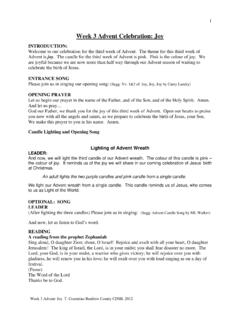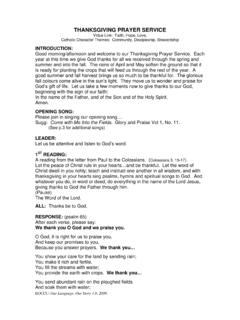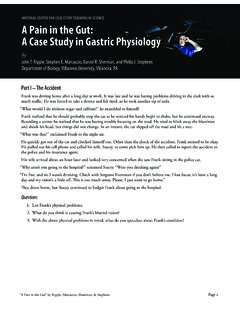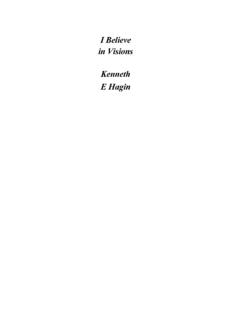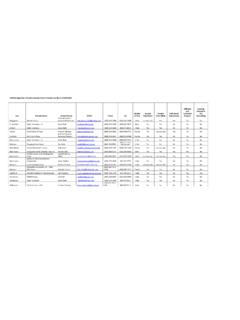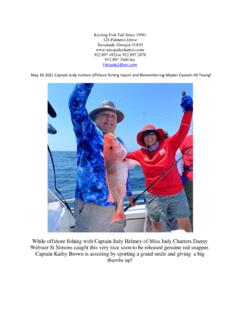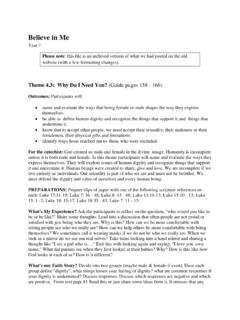Transcription of Grade 7 Religion – Believe in Me
1 Scope and Sequence Grade 7 CRITICAL OUTCOMES AND KEY CONCEPTS IN BOLD 1 Grade 7 Religion Believe in Me CRITICAL OUTCOMES AND KEY CONCEPTS IN BOLD Unit 1: Theme 1: Who am I? Students will: - Be able to use a process of self-examination to name their own gifts, talents, personality traits and goals - Name the value of the things they like about themselves - Constructively identify those things they wish to improve about themselves - Name the positive potential in a variety of personality types Prayer Focus- Psalm 139, 13-16 Key Concepts - Each person is created by God, is good and loveable, and is called to grow.
2 - Each person has unique gifts and talents to offer the world. - God calls us to serve with our gifts and talents. - We develop an understanding of what we are called to do by examining our interests, our likes and our dislikes. (Our personal call can be found where the desires of our heart meet the needs of the world. ) - We can learn about God by taking human beings as a starting point. Theme 2: Am I normal? Students will: - Demonstrate a knowledge of the many aspects of self - body, mind, emotions, will, ability to relate to others, spirit - and of the need to develop each aspect of these - Express normal as that which helps them develop their full potential in each aspect of self - Understand their own growth toward, or movement from, wholeness, and the way that this affects their relationship with God and the Christian community Prayer Focus-Litany of praise, praising God for making us as we are Key Concepts - We are intellectual, emotional.
3 Physical, social, and spiritual people. Each of these aspects of ourselves affects our relationships. - We are called to develop each aspect of ourselves in harmony with the development of each other aspect, and in harmony with God s call. - Each aspect of ourselves is a gift from God. All are important. - We are normal if we are developing as whole people. Theme 3: Do I belong? Students will: - Articulate the importance and requirements of participation in a community - Demonstrate familiarity with the structure of the Bible and be able to locate biblical passages - Understand the Bible as the story of the Christian community and its relationship with God - Know that the Christian community invites them to share in the abundant life of Jesus - Demonstrates skills for relating the community s story, as found in the Bible.
4 To their own lives - Name some ways that the community s story in their story Prayer Focus-Presentation of student bibles and enthronement of class bible Key Concepts - We are shaped by the communities in which we participate. - To truly be part of the Christian community, we must know its story, as it is told in both the New and the Old Testament, and make it our own. - God calls us to live in communities and interacts with us as members of a community. - The Bible is addressed to the community and should be interpreted in the community.
5 - At no point in time will every aspect of an individual s faith be strong and complete. The fullness of faith is found only in the community of faith. Scope and Sequence Grade 7 CRITICAL OUTCOMES AND KEY CONCEPTS IN BOLD 2 Unit 2: We Believe in God Theme 1: Whom do we trust? Students will: - Be able to articulate the meaning of trust and belief - Recognize that belief is rooted in a relationship of trust that demands honesty - Recognize Abraham as an example of a person whose whole life was shaped by trust - Name and evaluate what is involved in different types of believing and trusting - Demonstrate that skills and attitudes needed to build trusting relationships Prayer Focus- St.
6 Teresa s prayer of trust, mandala making, contemplation or journalling Key Concepts - Living life to the full demands a willingness to go beyond ourselves and take risks. - To be a person who believes is to be a person who is willing to make commitments. - God is the only one to whom we can entrust ourselves completely without reservation. - Trust is not a single act; rather, it is an ongoing attitude toward life and relationships. - Our beliefs shape who we are and the choices we make. We must understand our beliefs in order to understand ourselves and others.
7 Theme 2: Am I all on my own? Students will: - Name God s faithfulness as it is revealed in the story of the Exodus - that God is faithful even in very difficult situations, even when we are unfaithful - Connect the hope in the Exodus story to their own lives - Identify signs of God s presence and fidelity in the world around them -Identify ways they can help one another recognize the faithfulness of God Prayer Focus-Litany of thanksgiving Key Concepts - God is faithful; what God says, God does. - God does not remove us from all struggles, but rather walks with us and supports us in our searching and our struggling.
8 - We are called to develop patience. Without patience, it is difficult to live life to the full. - The story of the Exodus and of God s faithfulness to Israel is repeated over and over in the big and small events of our lives and our history. Scope and Sequence Grade 7 CRITICAL OUTCOMES AND KEY CONCEPTS IN BOLD 3 Unit 3: We Believe in God the Father Almighty Theme 1: Who loves me? Students will: - Reflect upon the meaning of being loved and the variety of ways in which love is demonstrated - Identify ways that God s love for us is reflected in the love and concern that people feel for us - Articulate the Church s belief that God s love goes far beyond human limitations - Explain how fatherhood and motherhood help us to understand God - Identify the signs of love and caring in the world around them Prayer Focus- A personal prayer book reminding students of God s constant presence.
9 Or a prayer for parents Key Concepts - God the Father is not subject to the weakness and limitations of human parents. God s love is the most ideal love that we can imagine from either a mother or a father. - God s parental tenderness can also be expressed it the image of motherhood. - By calling God Father, Jesus names God as a model for parenthood and reminds us of the great significance of parenting. - To think of God as our parent is to acknowledge our relationship to all other people. - When we name God as our parent, we set up an intimate relationship with God where we agree to both give and receive love.
10 We also accept responsibility for continuing God s work on earth. Theme 2: It s a free country. Why shouldn t I do whatever I want? Students will: - Demonstrate an understanding of the Sinai covenant as the sign of God s love and care for the Israelites - Explain the ways in which the Ten Commandments liberate and allow for greater love - Name the importance of covenants within their own lives and the way those covenants motivate moral behaviour - Examine their behaviour in the light of the Ten Commandments Prayer Focus- Meditation on Mark 10,17-22 (Jesus and the rich young man) Key Concepts - The commandments take on their full meaning within the covenant.
